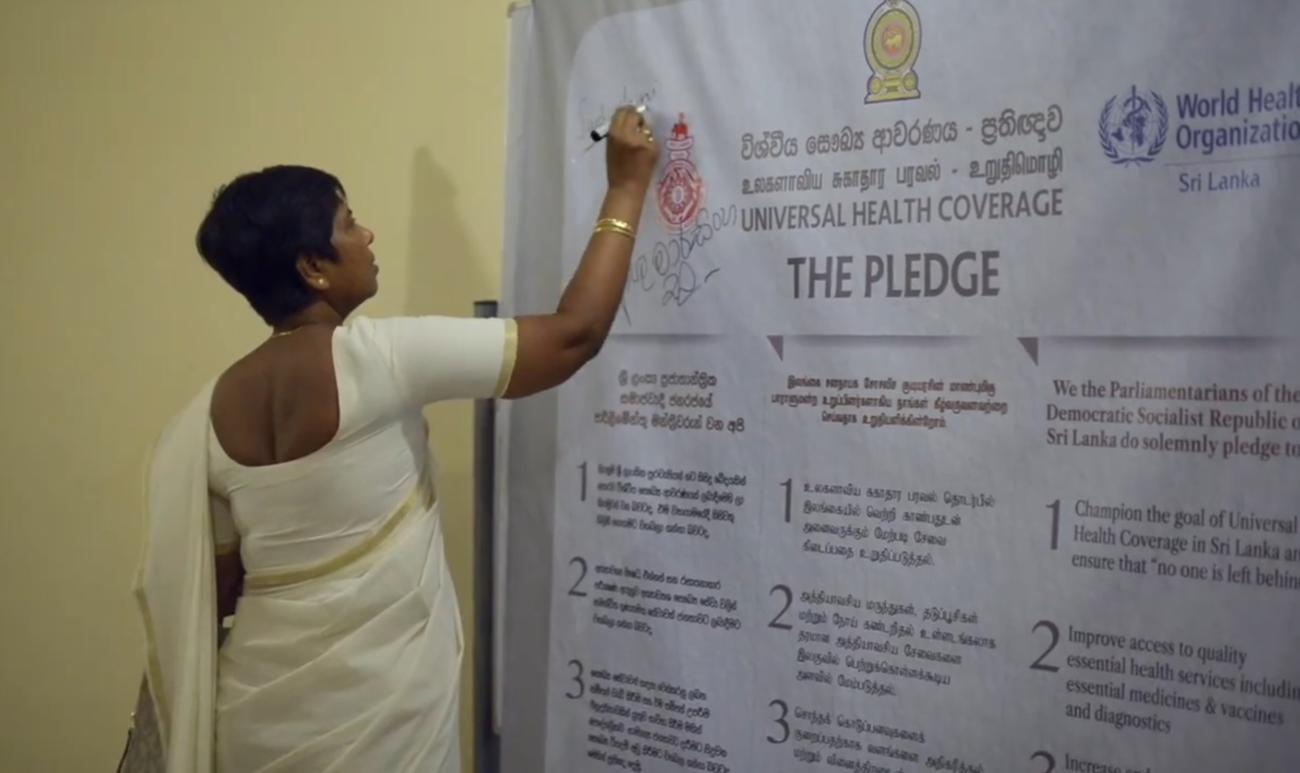Sri Lanka has endorsed primary health care to address the emerging challenges to achieve universal health coverage.
Business as usual is not an option for Sri Lanka. It is experiencing a rise in non-communicable diseases, a rapidly ageing population, changing societal expectations of health care and urbanization
All populations have guaranteed access to a package of quality care throughout the country.
The Sri Lankan Ministry of Health, in close partnership with the Sri Lankan Medical Association and WHO, developed an Essential Services Package and a service delivery model for PHC. An immediate next step was to organize an advocacy session in the Parliament resulting in the signing of a National UHC pledge.
Health is a human right because people don’t seek health care when they want it; they seek it because they need it. It’s a need and it’s our job as health care providers to provide them quality care.
Sri Lanka’s journey to UHC
Sri Lanka’s journey to UHC More than 50 years ago, before the 1978 Alma Ata Declaration, the country made a commitment to provide primary health care to its citizens.
The need for comprehensive and expanded financial and geographical access was clear, and Sri Lanka prioritized community health and successfully met the needs of that time.
The system specifically catered to maternal, child health and communicable diseases and delivered exceptional progress in maternal and child health.
It also successfully eliminated several communicable diseases such as malaria, filariasis, neonatal
tetanus, measles and polio.
However, like many other lower-middle income countries, Sri Lanka is now undergoing an epidemiological transition, with a rise in non- communicable diseases, a rapidly ageing population, changing societal expectations of health care and urbanization
Change is inevitable and necessary.
Meet a change-maker working on the ground who shares WHO's vision of universal health coverage. Dr Ruvaiz Haniffa, President of the Sri Lanka Medical Association (SLMA) reflects on progress in Sri Lanka.
The SLMA, the Ministry of Health and WHO share the same vision of a need to shift from diseaseoriented care to people-centered care. Change cannot happen overnight. We first wanted people to understand why we need to change and we needed to engage policymakers - the people with the power to decide on change.
WHO supported SLMA to host a parliamentary session with over 65 parliamentarians to sensitize
them to the concept of UHC and take steps necessary for Sri Lanka to fulfil SDG3. The highlight of this event was the signing of the UHC pledge by parliamentarians, representing all political parties in the country. WHO has expanded our horizon, by providing us a global platform to learn from others and build on what we have. They are a resource we simply can’t do without.

We had the international expertise we needed because WHO was able to find us the right people for the right job, and their technical guidance was invaluable. For example, at the parliamentary session we had Dr Somsak Chunharas, President of National Health Foundation and former Deputy Minister of Health in Thailand speak. That sharing of experiences is exactly what we needed. "SLMA, in collaboration with the Ministry of Health and WHO, also studied the gaps in the system and the different needs of different demographics. We have meticulously followed the healthseeking behaviour trends of the population. Based on these studies it became apparent that most people seek health care in an ambulatory setting as opposed to a hospital-based setting.

Since 2008, several models of care have been tested to nudge the system to change. An integral component of Sri Lanka’s early health care was the robust and effective nature of Primary Health Care services. Sri Lanka is at a turning point and it must turn to its roots and facilitate the need to restructure services. We feel certain that we can attain UHC through a PHC model, however when we looked at our health care delivery it is predominately hospital-based.
WHO has expanded our horizon, by providing us a global platform to learn from others and build
on what we have. They are a resource we simply can’t do without. We know their commitment to the health and wellbeing of the citizens of Sri Lanka, and Dr Tedros himself celebrated World Health Day here in Sri Lanka. They believe we can do this and it is our time to prove them right.
As President of SLMA my personal vision is to ensure all health care providers are wellrounded individuals with a hunger to better provide for our people. WHO is a constant source of support for us, sharing their best practices, their lessons learnt and bringing in international expertise to Sri Lanka; they are like a friend you call when in doubt."
Strengthening PHC
The Ministry of Health recognizes that the health system needs to change to sustain its gains and continue its journey towards UHC. Business as usual is not an option for Sri Lanka. The country has endorsed strengthening PHC as the means of addressing the emerging challenges to UHC.
WHO has supported the development of an Essential Services Package and the service delivery model based on the Cabinet-approved policy on health service delivery for UHC. This ensures that all populations have guaranteed access to a package of quality services throughout the country.
The Sri Lankan Ministry of Health identified WHO as the technical lead adviser in the PHC reorganization and WHO rallied support by engaging various stakeholders across sectors.
A key player is the Sri Lanka Medical Association (SLMA), the oldest professional medical association in Asia.
Starting in 2018, SLMA partnered with WHO to take forward the UHC agenda by organizing a series of
activities from policy advocacy to raising awareness of health providers in the field.
WHO provided close mentoring and resources for SLMA to increase awareness of health providers on UHC during their provincial meetings and academic sessions.
In July 2018, an advocacy session on UHC was organized in the Parliament of Sri Lanka, resulting in Parliamentarians making a UHC pledge.

